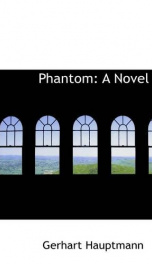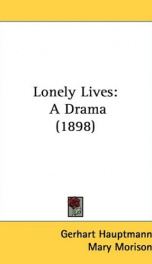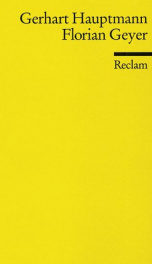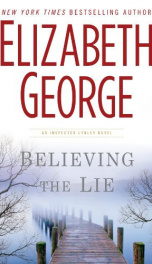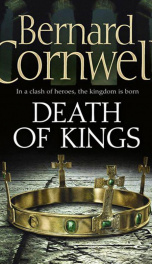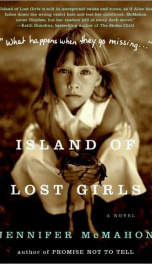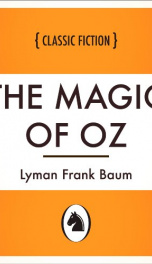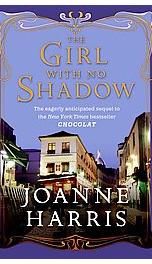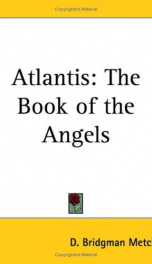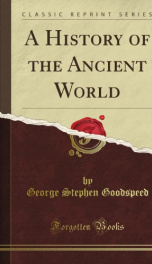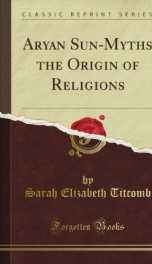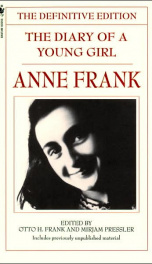Hauptmann Gerhart
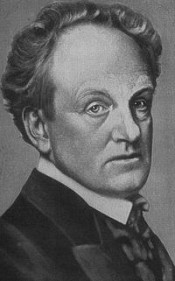
Gerhart Hauptmann (15 November 1862—6 June 1946) was a German dramatist who received the Nobel Prize in Literature in 1912. Hauptmann was born in Obersalzbrunn, a small town of Silesia, now known as Szczawno-Zdrój and a part of Poland. He was the son of a hotel-keeper. From the village school of his native place he passed to the Realschule in Breslau, and was then sent to learn agriculture on his uncle's farm at Jauer. Having, however, no taste for country life, he soon returned to Breslau and entered the art school, intending to become a sculptor. Here he met his life-long friend Josef Block. He then studied at Jena, and spent the greater part of the years 1883 and 1884 in Italy. In May 1885, Hauptmann married and settled in Berlin, and, devoting himself entirely to literary work, soon attained a great reputation as one of the chief representatives of the modern drama. In 1891 he moved to Schreiberhau in Silesia. Hauptmann's first drama, Vor Sonnenaufgang (1889) inaugurated the naturalistic movement in modern German literature. It was followed by Das Friedensfest (1890), Einsame Menschen (1891) and Die Weber (The Weavers 1892), a powerful drama depicting the rising of the Silesian weavers in 1844. Of Hauptmann's subsequent work, mention may be made of the comedies Kollege Crampton (1892), Der Biberpelz (1893) and Der rote Hahn (1901), the symbolist dream play The Assumption of Hannele (1893), and an historical drama Florian Geyer (1895). He also wrote two tragedies of Silesian peasant life, Fuhrmann Henschel (1898) and Rose Bernd (1903), and the dramatic fairy-tales Die versunkene Glocke (1897) and Und Pippa tanzt (1905). Hauptmann's marital life was difficult, and in 1904 he divorced his wife. That same year he married the actress Margarete Marschalk, who had borne him a son four years previously. The next year, his second marriage was interrupted by an affair with the 17-year-old Austrian actress Ida Orloff, whom he met in Berlin when she performed in his play The Assumption of Hannele. Orlov inspired characters in several of Hauptmann's works, and he later referred to her as his muse. In 1911 he wrote Die Ratten. In 1912, Hauptmann was awarded the Nobel Prize in Literature, "primarily in recognition of his fruitful, varied and outstanding production in the realm of dramatic art." During the First World War Hauptmann was a pacifist. In this period of his career he wrote several gloomy and historical-allegorical plays, like Der Bogen des Odysseus (1914), Der weisse Heiland (1912–17), Winterballade (1917). After the War, his ability was clearly on the wane. There are two full-length plays which are similar to the early successes, but with a little Realistic taste: Dorothea Angermann (1926) and Vor Sonnenuntergang (1932). He remained in Germany after Hitler's Machtergreifung and survived the fire storm of Dresden. His last bow is the Atriden-Tetralogie (1942–46). Several of his works have been translated into English. These include the plays which he wrote till Veland (1925), except Elga, an earlier fairy play and Festspiel in deutschem Reimen, a festival play. His works were published by S. Fischer Verlag. Hauptmann died at the age of 83 at his home in Agnetendorf (now Jagniątków, Poland) in 1946. Because of German atrocities committed in Poland during World War II, the Polish communist administration did not allow Hauptmann's relatives to bury him in Agnetendorf although even the Soviet military government recommended it as they admired the work of Hauptmann, his body was transported in an old cattle wagon to occupied Germany more than a month after his death. He was buried near his cottage on Hiddensee. This article incorporates text from the Encyclopædia Britannica, Eleventh Edition, a publication now in the public domain. Sully Prudhomme (1901) · Theodor Mommsen (1902) · Bjørnstjerne Bjørnson (1903) · Frédéric Mistral / José Echegaray (1904) · Henryk Sienkiewicz (1905) · Giosuè Carducci (1906) · Rudyard Kipling (1907) · Rudolf Eucken (1908) · Selma Lagerlöf (1909) · Paul von Heyse (1910) · Maurice Maeterlinck (1911) · Gerhart Hauptmann (1912) · Rabindranath Tagore (1913) · Romain Rolland (1915) · Verner von Heidenstam (1916) · Karl Gjellerup / Henrik Pontoppidan (1917) · Carl Spitteler (1919) · Knut Hamsun (1920) · Anatole France (1921) · Jacinto Benavente (1922) · William Butler Yeats (1923) · Władysław Reymont (1924) · George Bernard Shaw (1925)
do you like this author?
What readers are saying
What do you think? Write your own comment on this book!
write a commentWhat readers are saying
What do you think? Write your own comment on this author!
write a commentBook list

The Dramatic Works of Gerhart HauptmannVolume II
Series:
Unknown
Year:
Unknown
Raiting:
4.5/5
Show more
add to favoritesadd In favorites

The Dramatic Works of Gerhart HauptmannVolume I
Series:
Unknown
Year:
Unknown
Raiting:
2.5/5
Show more
add to favoritesadd In favorites
Book list

The Dramatic Works of Gerhart HauptmannVolume II
Series:
Unknown
Year:
Unknown
Raiting:
4.5/5
Show more
add to favoritesadd In favorites

The Dramatic Works of Gerhart HauptmannVolume I
Series:
Unknown
Year:
Unknown
Raiting:
2.5/5
Show more
add to favoritesadd In favorites
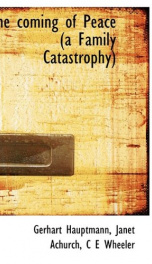
the coming of peace a family catastrophy
Series:
Unknown
Year:
Unknown
Raiting:
4.5/5
This volume is produced from digital images created through the University of Michigan University Library's large-scale digitization efforts. The Library seeks to preserve the intellectual content of items in a manner that facilitates and promotes a variety of uses. The digital reformatting process results in an electronic version of the original text that can be both accessed online and used to create new print copies. The Library also understands and values the usefulness of print and makes reprints available to the public whenever possible. This book and hundreds of thousands of others can be found in the HathiTrust, an archive of the digitized collections of many great research libraries. For access to the University of Michigan Library's digital collections, please see http://www.lib.umich.edu and for information about the HathiTrust, please visit http://www.hathitrust.org --This text refers to an alternate Paperback edition.
Show more
add to favoritesadd In favorites
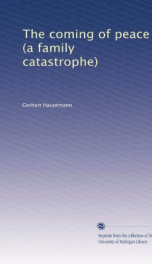
the coming of peace a family catastrophe
Series:
Unknown
Year:
Unknown
Raiting:
3.5/5
This volume is produced from digital images created through the University of Michigan University Library's large-scale digitization efforts. The Library seeks to preserve the intellectual content of items in a manner that facilitates and promotes a variety of uses. The digital reformatting process results in an electronic version of the original text that can be both accessed online and used to create new print copies. The Library also understands and values the usefulness of print and makes reprints available to the public whenever possible. This book and hundreds of thousands of others can be found in the HathiTrust, an archive of the digitized collections of many great research libraries. For access to the University of Michigan Library's digital collections, please see http://www.lib.umich.edu and for information about the HathiTrust, please visit http://www.hathitrust.org
Show more
add to favoritesadd In favorites
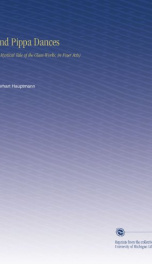
and pippa dances a mystical tale of the glass works in four acts
Series:
Unknown
Year:
Unknown
Raiting:
4.5/5
This volume is produced from digital images created through the University of Michigan University Library's preservation reformatting program. The Library seeks to preserve the intellectual content of items in a manner that facilitates and promotes a variety of uses. The digital reformatting process results in an electronic version of the text that can both be accessed online and used to create new print copies. This book and thousands of others can be found in the digital collections of the University of Michigan Library. The University Library also understands and values the utility of print, and makes reprints available through its Scholarly Publishing Office.
Show more
add to favoritesadd In favorites

Atlantis
Series:
Unknown
Year:
Unknown
Raiting:
5/5
excerpt from the book..The German fast mail steamer, _Roland_, one of the older vessels of theNorth German Steamship Company, plying between Bremen and New York, leftBremen on the twenty-third of January, 1892.It had been built in English yards with none of those profuse, gorgeousgold decorations in a riotous rococo style which are so unpleasant in thesaloons and cabins of ships more recently built in German yards.
Show more
add to favoritesadd In favorites
What readers are saying
What do you think? Write your own comment on this author!
write a commentGenre
- Literature & Fiction / Literary
- Literature & Fiction / Classics
- Religion & Spirituality / Christianity / Reference
- Nonfiction / Education / Education Theory / History
- Law / Criminal Law
- Literature & Fiction / Drama / British & Irish
- Books / Arthurian romances
- Comics & Graphic Novels / Graphic Novels
- Science Fiction & Fantasy / Science Fiction
if you like Hauptmann Gerhart try:
readers also enjoyed
What readers are saying
What do you think? Write your own comment on this author!
write a commentGenre
- Literature & Fiction / Literary
- Literature & Fiction / Classics
- Religion & Spirituality / Christianity / Reference
- Nonfiction / Education / Education Theory / History
- Law / Criminal Law
- Literature & Fiction / Drama / British & Irish
- Books / Arthurian romances
- Comics & Graphic Novels / Graphic Novels
- Science Fiction & Fantasy / Science Fiction
if you like Hauptmann Gerhart try:
readers also enjoyed
Do you want to exchange books? It’s EASY!
Get registered and find other users who want to give their favourite books to good hands!
